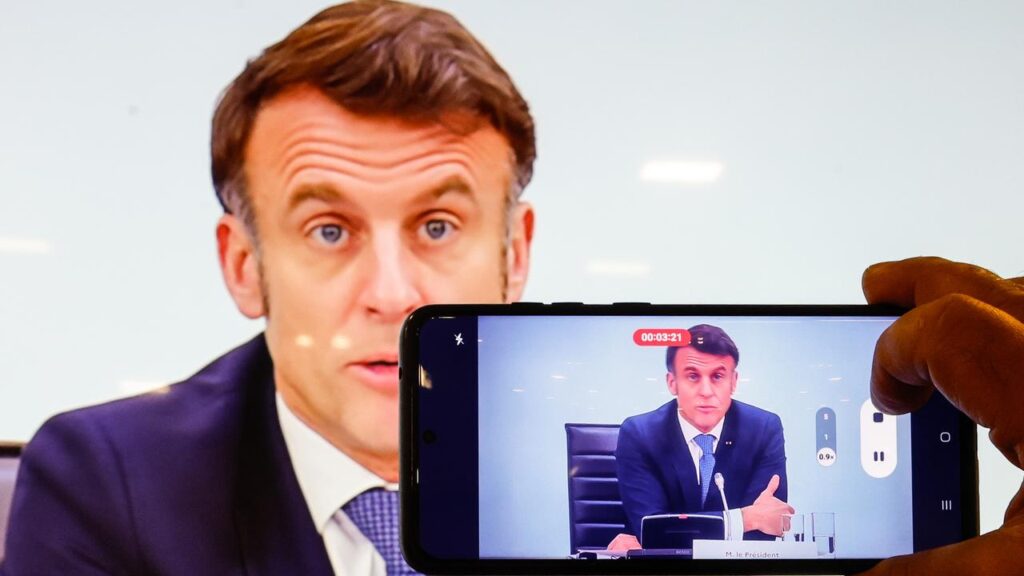European leaders in Paris seek united front on Ukraine
|

European leaders sought to form a united front at emergency talks in Paris, called after a US diplomatic blitz on Ukraine which has thrown a once-solid alliance into turmoil.
Shortly before the meeting, French President Emmanuel Macron spoke with US President Donald Trump, but Macron’s office would not disclose details about the 20-minute discussion.
Leaders of Germany, the United Kingdom, Italy, Poland, Spain, the Netherlands, Denmark and the European Union met at the Elysee Palace for talks on Europe’s security quandary. NATO Secretary General Mark Rutte was also there.
Since last week, top US officials from the Trump administration, on their first visit to Europe, left the impression that Washington was ready to embrace the Kremlin while it cold-shouldered many of its age-old European allies.

Keith Kellogg, Trump’s special envoy for Ukraine and Russia, underlined Monday that Europe has no place at the negotiating table.
“All their concerns will be known, and addressed as well,” Kellogg told reporters in Brussels, where he briefed the 31 US allies in NATO, along with European Union officials, before heading to Kyiv for talks on Wednesday with Ukrainian President Volodymyr Zelenskiy.
“I don’t think it’s reasonable and feasible to have everybody sitting at the table. We know how that can turn out and that has been our point, is keeping it clean and fast as we can,” he said.
Kellogg’s remarks come after a flurry of speeches by Vice President JD Vance and Defence Secretary Pete Hegseth last week questioned both Europe’s security commitments and its fundamental democratic principles.
Macron, who has long championed a stronger European defence, said their stinging rebukes and threats of non-cooperation in the face of military danger felt like a shock to the system.
The tipping point came when Trump decided to up-end years of US policy by holding talks with Russian President Vladimir Putin in hopes of ending the Russia-Ukraine war.
German Chancellor Olaf Scholz told reporters a possible peace agreement with Russia cannot be forced on Ukraine from outside.
“We welcome the fact that talks are taking place, that peace is developing everywhere. But for us it must and is clear: this does not mean that peace can be dictated and that Ukraine must accept what is presented to it,” he insisted after he left the Elysee Palace.
“Negotiations are moving fast with Europe,” Zelenskiy said in a virtual news conference Monday in Kyiv, adding recent US moves “accelerated everything,”
Zelenskiy said Macron had agreed to provide him with a briefing on the conclusions from the meeting in Paris.
Hungarian Foreign Minister Péter Szijjártó has slammed the Paris emergency summit as a gathering of “frustrated European politicians,” accusing leaders of looking to prolong the conflict.
UK Prime Minister Keir Starmer appears to be charting a “third way” in Europe’s shifting geopolitical landscape — aligning strategically with Trump while maintaining EU ties.
Some analysts suggest this positioning could allow him to act as a bridge between Trump and Europe, potentially serving as a key messenger to the White House on his visit to Washington DC next week.
Starmer said that the UK was “ready and willing to contribute to security guarantees to Ukraine by putting our own troops on the ground if necessary”.
“I do not say that lightly. I feel very deeply the responsibility that comes with potentially putting British servicemen and women in harm’s way,” he wrote.
Macron last year refused to rule out sending Western troops into Ukraine if necessary.
Polish Prime Minister Donald Tusk has said his country would not send troops to Ukraine.
“We do not plan to send Polish soldiers to the territory of Ukraine. We will … give logistical and political support to the countries that will possibly want to provide such guarantees in the future, such physical guarantees,” he said.
Yet Scholz said it was too soon to talk about boots on the ground.
“It is completely premature and completely the wrong time to have this discussion now. I’m even a little irritated by these debates,” Scholz said. Peace talks “have not taken place and … Ukraine has not said yes and has not sat at the table.
“This is highly inappropriate, to put it bluntly and honestly: we don’t even know what the outcome will be,” he added.

Denmark’s Prime Minister Mette Frederiksen said she could sense “a new, European determination, a seriousness and a drive that are necessary”.
“We must remove the restrictions on the Ukrainians’ use of weapons so that they can actually defend themselves against the Russians without having one arm twisted behind their back,” she said in a statement.
“A ceasefire must not lead to Russian rearmament, which is replaced by new Russian attacks.”
Some of the EU nations balked at the thought of the restrictive Elysee meeting with only a few chosen leaders while others were left in the cold.
with Reuters and dpa
AP